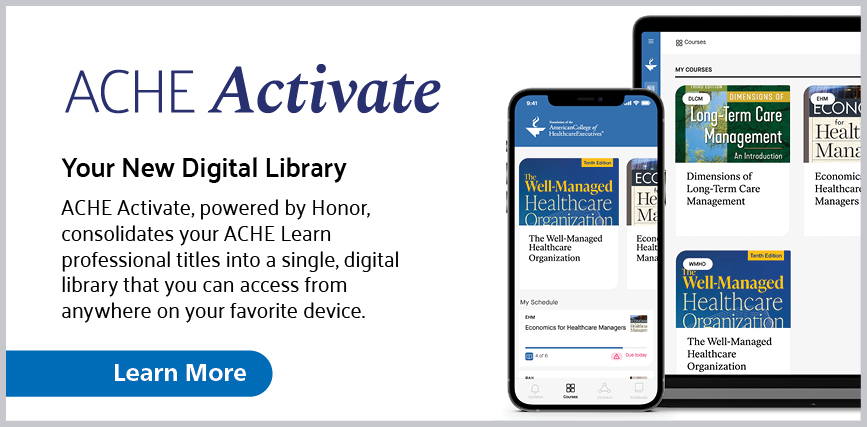
- Gold Medal Award Winner Skogsbergh Reflects, Shares Optimism
- Quality Care Tied to Safety Culture
- Reaching Next-Generation Community Health Goals
- Using Science and Technology to Improve Leadership Skills
Gold Medal Award Winner Skogsbergh Reflects, Shares Optimism
Commitment, continuous learning and patience are crucial to professional success in the healthcare field, especially when facing tough challenges and increasing financial pressures, according to James H. Skogsbergh, FACHE. In difficult situations, Skogsberg says in a recent ACHE podcast, “people want calm, they want to not be afraid and they want to know that somebody’s with them.” Truly effective leadership creates “calm over chaos, faith over fear.”
Winner of ACHE’s 2025 Gold Medal Award, Skogsbergh “kind of backed into healthcare,” but knew immediately it was the right place for him. He spent more than 16 years at the helm of Advocate Health Care, including four years leading Advocate Aurora Health to national renown, and then serving as CEO of Advocate Health, until he retired in 2024.
During his tenure, he worked to build open, inclusive environments that encouraged both talking and listening. “I’m not a big fan of silos,” he says, pointing out that a safe environment for debate encourages people to “take off the gloves and give us their best thinking. We made great decisions when we had everybody’s best thinking.”
When asked about the future of healthcare leadership, Skogsbergh shared his optimism by noting the up-and-coming “incredible talent” in the industry.
Listen to Skogsbergh’s reflections on his career, where he shares some of his best advice for emerging leaders. Find the Healthcare Executive Podcast library here.
Quality Care Tied to Safety Culture
In healthcare today, many organizations are focused on delivering high reliability for key healthcare processes, and Rich Greenhill, DHA, FACHE, suggests using a data-enabled multi-disciplinary team approach to foster a patient-centered just culture. Greenhill’s latest research indicates high quality and high value care comes from an environment that supports democratized thought where anyone can raise their concerns and stop the line.
Greenhill discussed key strategies to update and enhance quality and team collaboration at a recent ACHE seminar, where he presented tools to create an environment of psychological safety. Greenhill’s seminar emphasized the importance of fostering an environment of trust with reduced conflict to provide patient safety and quality care. “In this period of great change and transition, patient safety must remain the top focus,” said Greenhill. “Our continued vigilance to ensure care teams feel safe at all levels is paramount for the future.”
Greenhill is one of dozens of expert ACHE Faculty members, who travel to hospitals and health systems across the country to facilitate in-person, customizable and cost-effective learning opportunities for staff.
Learn more about Greenhill’s topic, as well as Customized Learning for Organizations programs that ACHE offers for your leadership team onsite. For more information, email Martijn van Oort, director, business development, ACHE Learn.
Reaching Next-Generation Community Health Goals
Health systems and health plans are ideally positioned to advance community health, which sometimes requires dismantling and rebuilding existing systems.
Each healthcare sector is critical “to creating a cohesive ecosystem that can truly provide whole person care and curb healthcare costs,” says Karin VanZant, one of the authors of Socially Determined: The Healthcare Executive’s Role in Health Equity (ACHE Learn, 2024). VanZant notes that in addition to healthcare stakeholders, social and human services should have a voice in working to achieve community health.
In Socially Determined, Van Zant, along with Shawn Rossi, DHA, FACHE, and Kina White, DrPH, FACHE, provide the essential elements pertinent to community health and explain its relationship with value-based care and healthcare quality.
Through practical insights, real-world case studies and tools, the authors note that reading this book “will equip healthcare executives with actionable strategies to make community health a core organizational priority, whether they work in a hospital, managed care or public health.”
Using Science and Technology to Improve Leadership Skills
Leaders who want to remain competitive and sustainable are pairing cutting-edge technology, such as AI and simulations, with the latest behavioral science to boost their healthcare leadership skills.
Whether you want to increase employee engagement, reduce burnout or improve patient-centered outcomes and long-term sustainability, discover the tools and knowledge you need to succeed with Brian R. Spisak, PhD, senior partner/chief people and communication officer, Csuite Growth Advisors; and program director, AI and Leadership, National Preparedness Leadership Initiative, Harvard T. H. Chan School of Public Health.
Spisak will present “Human-Centered Leadership for the Next Era of Digital Healthcare Systems,” a virtual interactive program that runs July 8–Aug. 5. The course will help leaders:
- Identify digital solutions to systemic challenges.
- Assess skills necessary for next-level leadership in the digital era.
- Practice using cutting-edge technology.
Participants who complete the course are eligible for 6 ACHE Virtual Interactive Education credits. Register for this program or visit Virtual Interactive Education to learn about other available online programs.



